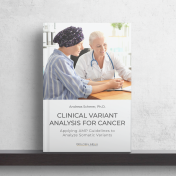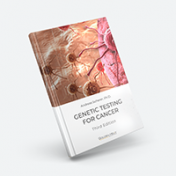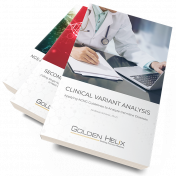Clinical Variant Analysis for Cancer – Applying AMP Guidelines to Analyze Somatic Variants As described in my eBook “Genetic Testing for Cancer,” any bioinformatic pipeline for cancer ultimately calls variants based on the aligned reads that the sequencer generated. Variant calling is the process of reviewing a sequence alignment, typically in the form of a BAM file, to identify loci… Read more »
Clinical Variant Analysis for Cancer – Applying AMP Guidelines to Analyze Somatic Variants Analogous to the ACMG guidelines for germline mutations, the Association for Molecular Pathologists (AMP) has issued guidelines to assess and report on somatic variants. The key paper in this area was published by Li et. al (2017) with the title “Standards and Guidelines for the Interpretation and… Read more »
Clinical Variant Analysis for Cancer – Applying AMP Guidelines to Analyze Somatic Variants Precision Medicine uses genetic information from individual patients. This may include the following areas: Diagnosis Treatment Prevention Specifically, in the cancer space, data derived from Next-Gen Sequencing (NGS) is used to diagnose and prognose diseases, select a targeted therapy and potentially evaluate the suitability of a patient… Read more »
Applying AMP Guidelines to Analyze Somatic Variants Today, I am thrilled to share with you the launch of a brand new eBook titled “Clinical Variant Analysis for Cancer – Applying AMP Guidelines to Analyze Somatic Variants”. We would happy to send you a complimentary copy which can be requested on our website here. The clinical utilization of Next-Gen Sequencing data… Read more »
Yesterday, I released a new version of my eBook, “Genetic Testing for Cancer – Third Edition”. We would be happy to send you one! To download a complimentary copy, please submit a request on our site here. In 1914, the German cytologist Theodor Boveri coined the phrase “Cancer is a disease of the genome.” At this time, his ideas were… Read more »
Overview VSClinical enables users to evaluate variants according to the ACMG guidelines in a high-throughput fashion and obtain consistent results and accurate variant interpretations. This feature is tightly integrated into our VarSeq platform as well, and when paired together, users can evaluate NGS data and obtain clinical reports all in one suite. Coupled with the ability to find novel or… Read more »
Sentieon develops bioinformatics secondary analysis tools to process genomic data with high computing efficiency, fast turnaround time, exceptional accuracy and 100% consistency. These features are what led to the partnership of Golden Helix and Sentieon to provide users with a comprehensive solution for genomic data analysis. This blog post gives readers a more detailed understanding of the top five features… Read more »
In the previous two articles, we explored the different steps of a clinical workflow. The first post covered the automated analysis that creates a VarSeq project. While the second post covered the interpretation steps and generation of a clinical report. These posts illustrated the ease with which these complex tasks can be carried out. Today we’ll dig a little bit… Read more »
In the previous blog post, we covered the automated steps to create a VarSeq project. Today we will examine the active analysis steps. These are the steps that require human interpretation to analyze the clinically relevant variants. A lab tech can take the first pass at the output in the generated VarSeq project. They can perform the quality control and… Read more »
Automating a clinical workflow creates a stable and repeatable clinical analysis. Automation reduces the potential to introduce human error, helps in regulatory compliance, and improves the precision of the clinical results. It is important to know that if you run a sample through your clinical pipeline, you are going to get the same results today as you will in 6… Read more »
Mark Trinder is our 2019 Abstract Competition 1st Place Winner. As we prepare for his upcoming webcast on April 10, 2019, we wanted to give our community a little bit of a background on him! Mark Trinder is an MD/Ph.D. student at the University of British Columbia, Canada working under the supervision of Dr. Liam Bruham. Mark’s research focuses on… Read more »
Golden Helix, Inc. has announced themselves as the recipient of an NIH SBIR Grant 2R44GM128485-02 entitled “Automated and Guided Workflows for Clinical Testing Using NGS Assays.” “With the help of this grant, we will take the clinical automation of NGS data to the next level, focusing on germline diseases and cancer diagnostics,” states Andreas Scherer, Ph.D., President, and CEO of… Read more »
This year has been full of excitement for our team, and customers as well; we have a plethora of recently published articles citing Golden Helix! We would like to congratulate everyone on their success. Please enjoy these features articles, or see the full list here. SNP & Variation Suite Di Gerlando, R.; Mastrangelo, S.; Sardina, M.T.; Ragatzu, M.; Spaterna, A.;… Read more »
Examples of Clinical Variant Interpretation with VSClinical In this chapter, I’d like to go through a few examples for variants that have been classified with the help of VSClinical. This will give you a better understanding of how data sources are actually being represented in the software and how those are used to make decisions on applicable criteria. It goes… Read more »
Rules for Combining Various Classification Criteria Now that we have a solid understanding of how the various criteria are meant to be applied, it’s time to look at how the evidence collectively leads to the clinical categorization of a variant. Let’s go through the rule framework for combining the various criteria. Pathogenic In order for a variant to be classified… Read more »
Clinical Variant Analysis – Classification Criteria of Benign Variants The classification of benign variants is overall simpler and more straightforward, with the majority of benign variants being eliminated through allele frequency in various population catalogs. BA1 If a variant is common in one or more population catalog, as indicated by the allele frequency associated by the appropriate sub-population, it can… Read more »
We would like to thank everyone who entered our 2019 Abstract Competition. This event is an excellent opportunity for our team to hear the unique ways Golden Helix software is being applied around the world. We had a number of remarkable entries this year which made our selection process a daunting one, indeed. It is my pleasure to announce this… Read more »
Clinical Variant Analysis – Classification Criteria of Pathogenic Variants The ACMG Guidelines are utilized for the interpretation of variants. They are primarily applied to diagnose suspected inherited (primarily Mendelian) disorders in a clinical diagnostic laboratory setting. While evaluating variants no matter what the origin, it is important to distinguish between variants that are pathogenic (i.e., causative) for a disease and a… Read more »
Clinical Variant Analysis – Applying ACMG Guidelines to Analyze Germline Diseases The clinical interpretation of genetic variants is time-consuming and requires strict attention to detail. Clinicians must thoroughly review any variants that could potentially cause disease using a complex set of guidelines. There are guidelines for the interpretation of variants relating to hereditary risk, germline diagnostics issued by the American… Read more »
I am excited to announce the release of my new eBook “Clinical Variant Analysis – Applying ACMG Guidelines to Analyze Germline Diseases“! You can download your complimentary by clicking on the button below. The clinical interpretation of variants in Next-Gen Sequencing is a quickly evolving field. While the body of knowledge is growing exponentially, experts have to derive sound, clinical decisions leveraging an… Read more »










